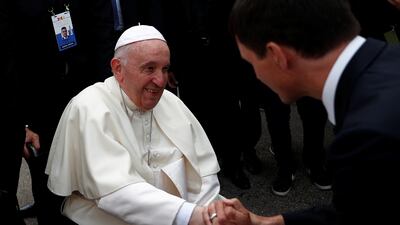Pope Francis arrived in the Canadian city of Edmonton late on Sunday morning to kick off a week-long trip to Canada. The Pope will meet indigenous leaders and is expected to apologise for the Catholic church's treatment of indigenous Canadians.
“Dear brothers and sisters of Canada, I come among you to meet the indigenous peoples,” the Pope tweeted, before departing the Vatican for Canada. “I hope, with God's grace, that my penitential pilgrimage might contribute to the journey of reconciliation already undertaken. Please accompany me with prayer.”
The Pope was met at the airport by Canadian Prime Minister Justin Trudeau, Governor General Mary Simon, and several survivors of the country’s disastrous residential school programme.
The leader of the Catholic Church, 85, who has been experiencing knee troubles which forced him to cancel a previously planned trip to Africa, used a wheelchair to travel from his Fiat 500 car to the stage. He then sat with Canadian dignitaries for a brief welcome ceremony.
The discovery in May 2021 of more than 200 unmarked graves at the site of a former residential school in Kamloops, British Columbia, sparked a nationwide reckoning with the country’s historical and present-day treatment of indigenous people.
That reckoning stretched beyond the borders of Canada to the Vatican. In April of this year, members of Canada’s indigenous communities travelled to Vatican City, where they met with the Pope, who apologised for the church's role in the residential school system.
Starting in the 1800s and continuing for more than 100 years, the Canadian government ran a large network of schools designed to forcibly assimilate the country's indigenous peoples. The government often relied on the Catholic church to oversee the schools.
It was not until 1996 that the last residential school closed, officially ending a school system that ripped communities apart.
Children as young as 3 were taken from their homes, often without their parents’ permission, and dropped at boarding schools where they were not allowed to use their native languages. Punishments were often severe and sexual abuse was rife.
For years, the federal government and Canadians in general ignored the horror stories that came out of these schools. However, in 2008, the federal government launched a National Truth and Reconciliation Commission.
The commission, which ran for about seven years, published a report that said what transpired at Canada’s residential schools amounted to a “cultural genocide".
It estimated that more than 4,100 children died or went missing while attending residential schools across the country.
On Monday, Pope Francis will visit the site of a former residential school in Maskwacis, a first nations community south of Edmonton.
The Pope will also travel to Quebec City and the northern territory of Nunavut, where he will meet residential school survivors.















